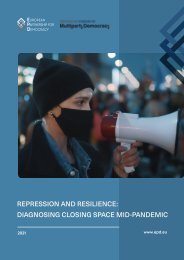Thinking Democratically: A Comprehensive Approach to Countering and Preventing Shrinking Space
You also want an ePaper? Increase the reach of your titles
YUMPU automatically turns print PDFs into web optimized ePapers that Google loves.
politics globally, claiming that democratic countries in the West are just as flawed as authoritarian<br />
regimes.<br />
In Europe, such a Russian-sponsored narrative similarly taps in<strong>to</strong> <strong>and</strong> supports anti-democratic<br />
movements <strong>and</strong> far-right political parties. Soft power <strong>to</strong>ols such as Russian propag<strong>and</strong>a <strong>and</strong><br />
disinformation on social media are the main method of interference in Europe. Proof of Russian<br />
disinformation during the European Parliament <strong>and</strong> other national elections is rife, <strong>and</strong> there are<br />
allegations of Russian meddling in the UK’s Brexit referendum. In addition, certain elected political<br />
leaders in Eastern Europe have close ties <strong>to</strong> Russia, such as Czech President Zeman <strong>and</strong> politicians<br />
within the Lega Party in Italy <strong>and</strong> the Rassemblement National in France. Russia’s role in shrinking<br />
democratic space is thus particularly powerful in its neighbourhood.<br />
China, on the other h<strong>and</strong>, has played an important role in sub-Saharan African countries, exemplified<br />
here by the case of Zimbabwe. China is Zimbabwe’s biggest inves<strong>to</strong>r, limited not only <strong>to</strong> diamond<br />
mining, but even the building of the Zimbabwean Parliament <strong>and</strong> the Intelligence Services buildings.<br />
Even more worrying is Chinese investment in surveillance technology, particularly the artificial<br />
intelligence powered national facial recognition database that is currently being developed by a<br />
Chinese company in Zimbabwe. 68<br />
The global p<strong>and</strong>emic has seen China boosting its diplomacy efforts, notably by sending medical<br />
assistance <strong>and</strong> supplies <strong>to</strong> other heavily affected countries. For instance, China sent planeloads of<br />
equipment <strong>and</strong> six medical experts <strong>to</strong> Serbia, fueling tension between Serbia <strong>and</strong> the EU on the lack<br />
of EU support <strong>and</strong> accession-issues. 69 The EU, on the other h<strong>and</strong>, has been late in assistance <strong>to</strong> its<br />
own member states <strong>and</strong> aspiring member states in the Western Balkans, with Chinese support arriving<br />
earlier. 70 China has also actively tried <strong>to</strong> influence the narrative on the origin of the virus <strong>and</strong> the<br />
effectiveness of different governments <strong>and</strong> regime types in dealing with the virus. Chinese influence<br />
globally is expected <strong>to</strong> increase further as a result of the crisis, particularly in its spheres of influence<br />
in Africa, Eastern Europe, Latin America <strong>and</strong> South-East Asia. 71<br />
68<br />
Biometric Update (2018): Implementation of CloudWalk facial recognition technology in Zimbabwe progressing in stages. Available here.<br />
69<br />
Walker, S. (2020): Coronavirus diplomacy: how Russia, China <strong>and</strong> EU vie <strong>to</strong> win over Serbia. The Guardian. Available here.<br />
70<br />
Economist Intelligence Unit (2020): Geopolitics after Covid-19: is the p<strong>and</strong>emic a turning point? Available here.<br />
71<br />
Economist Intelligence Unit (2020): Geopolitics after Covid-19: is the p<strong>and</strong>emic a turning point? Available here.<br />
38

















